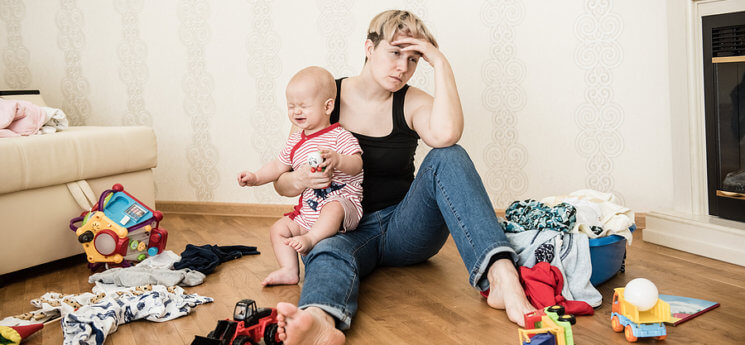The precious moments make it all worthwhile, and the adrenaline rush can’t be matched—but the number of women who report being significantly fatigued a week or two after giving birth is nearly 70 percent. Even six months into motherhood, fatigue is the third most frequent complaint, after respiratory and sexual problems.
“Having a new baby isn’t just exhausting because of the sleep deprivation, but because the learning curve is so steep, especially with your first child,” says Heather Wittenberg, PsyD, a parenting psychologist in Maui, Hawaii, and founder of babyshrink.com. At first, “routine things like diapering, breastfeeding or even going grocery shopping with an infant can be overwhelming.”
Indeed, simply wrapping your head around the fact that you’re responsible for a tiny, vulnerable person can be the psychological equivalent of a triathlon. And just when you need them most, clarity and energy are nowhere to be found. “When you’re fatigued, your ability to perform even simple tasks is impaired,” says Shari Mezrah (aka “The Sleep Mom”), a sleep schedule specialist in Tampa, Fla., and author of The Baby Sleeps Tonight. “You have a harder time concentrating, solving problems, making decisions and, therefore, safely and effectively meeting your child’s needs.”
But take heart: The challenges of parenthood are not insurmountable. “They just require a plan,” says Mezrah. Follow these steps and you’ll be on the road to rejuvenation, stat.
Simple strategies for overcoming postpartum fatigue.
1. Chew the right thing
Whether you’re thinking about the preggo pounds or just feeling too taxed to eat right, exhaustion will certainly ensue from a poor diet. “Since I’m breastfeeding, I have the appetite of a football player—but grabbing whatever sweet treat is in front of me never helps,” says Alexandria Aranoff, mom to 8-month-old Reese in San Francisco. “Switching to healthy snacks like apples with peanut butter or cottage cheese with peaches makes a huge difference in my energy levels.”
Of course, quality and quantity are crucial. The fact is, breastfeeding burns about 500 calories a day—so consuming any fewer than 1,500 calories a day can put you at risk for nutritional deficiencies, make you more susceptible to illness and lower your energy levels, says Glade B. Curtis, MD, an obstetrician-gynecologist in Salt Lake City, Utah, and coauthor of Your Pregnancy Quick Guide: Postpartum Wellness.
“Even if you’re bottle-feeding, do not crash-diet,” Curtis says. “Your body needs a balance of lean protein, complex carbohydrates and healthy fats for energy.” Deficiencies in folic acid, iron and vitamin D in particular can lead to fatigue and, according to research in the journal Annals of Hematology, more than 75 percent of women don’t start their pregnancies with enough iron stores, and only five percent increase their intake enough to make up the difference.
To ensure you’re consuming enough of the right foods, visit the USDA’s mypyramid.gov, which includes links for “Pregnancy and Breastfeeding”—but remember to keep it simple. “Preparing and freezing meals ahead of time can save you a lot of stress,” says Mezrah. You might also use a meal delivery service for the first few weeks after the baby’s arrival. If eating right still eludes you, talk to your doctor about supplements—especially if you’re nursing.
2. Sip incessantly
Babies aren’t the only ones who need to drink a lot. Postpartum fatigue is often tied to dehydration. “I make sure I have a glass of water on hand at all times and also sip herbal teas throughout the day,” says Lisa Byrne, MPH, a holistic health coach, founder of Well Grounded Life and mother of three children under the age of 4 in Scotch Plains, N.J. Byrne says that she gets more long-lasting energy from green tea than from coffee. Whatever you sip, aim to keep sugary, caffeinated beverages and alcohol to a minimum—even if you’re not nursing—since both can throw your energy levels out of whack and compromise quality sleep.
3. Get outside
Staggering around in public wearing sweatpants and spit-up may sound about as appealing as going back into labor. But the longer you stay holed up with the baby, the more drained you’ll get. “As hard as it is to drag yourself out of the house after surviving another sleepless night, it is very important to try to get some natural light,” says Wittenberg. “Staying inside can even contribute to postpartum depression.”
That’s because bright light tells your brain to produce serotonin, which helps you feel awake, alert and—yes—happy! You don’t even have to do anything while you’re at it (although a little exercise couldn’t hurt—see #5). “Just sitting in my backyard, getting some fresh air and talking on the phone lifted my spirits and gave me more energy after I had my son,” says Dana Marlowe, mom to 2 1/2-year-old Micah in Silver Spring, Md.
4. Give yourself a hand
No matter how much times have changed, it still takes a village to raise a baby. “Don’t buy into the Supermom myth,” says Wittenberg. “Accept help from friends and family members, even if you have a hard time handing the baby over to someone else.” Consider joining a new-parent support group as well. “Being able to talk to other moms who are nonjudgmental, and just discovering that you’re not alone—that it’s normal but exhausting having a new baby—frees you up from stress and concerns that can otherwise wear you out,” says Fran Walfish, PsyD, a Beverly Hills, Calif., psychotherapist and author of The Self-Aware Parent.
You might also need to consult a certified pro—like a postpartum doula (visit dona.org) or lactation consultant (ilca.com) for certain new-mom challenges. “I was super tired after having my second baby, but going to see a lactation consultant made all the difference,” says Chrissy Atley, mom to 1 1/2-year-old Ella and 4 1/2-year-old Jude in Claremont, Calif. “She showed me how to get my daughter to latch and nurse more efficiently and to look for signs she was done eating, and told me not to wake her up to feed her. Ella immediately started sleeping for six hours straight!”
5. Bust a move
If you weren’t into exercise before, motherhood might just change that—and not only because it can get you back into your skinny jeans or set a good example for your child. “Going on long walks in the morning or in the late afternoon when I’m really low on energy helps a lot,” says Aranoff. It’s the simplest way to squeeze in some activity, since you can take baby along in a stroller. Los Angeles–based trainer Valerie Waters, who has helped celebrities like Jennifer Garner get back into shape, also emphasizes the importance of strength training and is especially partial to simple moves done in a circuit—one after another with no rest in between—like basic squats, dumbbell chest presses, two-arm rows, planks and mountain-climbers.
“This is a really efficient way to get some cardiovascular benefit while building your strength,” Waters says. “It gives you an energy boost and the power to do more with less effort, and it lowers your stress levels and improves the quality of your sleep.” Of course, you shouldn’t push yourself to do too much too soon. The American College of Obstetricians and Gynecologists says some women may be able to engage in an exercise routine within days of delivery, but others may need to wait four to six weeks.
6. Take naps
You’ve probably heard the advice to “sleep when the baby sleeps” more times than you can count, but that’s often easier said than done. “I literally just forced myself to nap,” says Lara Serebrier Paul, mom to 1-year-old Caleb in New York City. “No matter how dirty the house was or how much I had to do, when my son went to sleep, so did I.” Even if you don’t think you want or need to rest, give it a shot. “It wasn’t always easy to fall asleep in the middle of the day, but I found if I just closed the curtains, got into bed and shut my eyes, 99 percent of the time, I fell asleep.” If the snooze-fairy refuses to visit, just do something restorative. “Even five minutes of deep breathing can rejuvenate you because your body and mind get oxygenated, your calm response gets switched on and you begin to mitigate any stress buildup,” notes Byrne.
Forget about staying up late, and make nighttime z’s a priority as well. “Dimming the lights in the house, avoiding the glare of a computer screen or TV, minimizing noise and stimulation, rubbing your feet with natural oils, stretching, reading quietly or journaling are all excellent options for creating a routine that signals to your body and mind that you are ready to enter deep, restorative sleep,” says Byrne. Sharing childcare duties can also help ensure you get a solid stretch. “If you’re breastfeeding, your partner can change the baby and then bring him to you,” says Curtis. “After your milk becomes established, he could feed the baby a bottle of expressed milk on alternate nights.”
7. Take care of yourself
A little pampering has never been more important. “I make time each week to do something for myself like a mani/pedi, a massage or going to see a movie with a friend—and my husband and I try to go on a date every couple of weeks,” says Aranoff. “I also put a little makeup on every day. I may not get out of my yoga pants and T-shirt, but a little lipstick and blush makes me feel pretty—and if I look less tired, I feel less tired!”
Indeed, the best thing you can do is give yourself a break—literally and figuratively. Let go of the notion that you need to be perfect, and remember that time really does fly. Before you know it, you baby will be all grown up and maybe, just maybe, you’ll even miss these crazy, sleep-deprived days.




